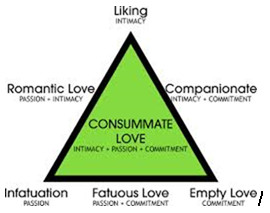 Being in love with someone is the highest form of human expression. When you find someone to share your life with, it is important to have a real understanding of what love is so that you and your partner are able to live a happy and fulfilled life together.
Being in love with someone is the highest form of human expression. When you find someone to share your life with, it is important to have a real understanding of what love is so that you and your partner are able to live a happy and fulfilled life together.
Firstly, healthy love requires a maturity and self awareness about what you want from life. Young love often doesn’t take this into account because it is mixed up with feelings of passion, excitement and great expectations. Your perceptions about love will also be influenced by what you have experienced and seen as a younger person growing up, from your parents and significant others. That is why sometimes, as a young person you may not be sure what to expect from love, because experiences and views of love may have been distorted, damaged and influenced by movies, songs, societal expectations and others around you.
You will know (when you are in a relationship) if your love for one another is healthy if you …..
- Are able to be yourself within a relationship – you will have to have a fair bit of self awareness about yourself and be able to tell the other how you feel, even if it is not what the other person wants to hear sometimes.
- You feel loved, valued and respected. You will generally feel happy and content most of the time because you know that your partner loves you by respecting and listening to you. You will be ‘heard’ in the relationship. You will be able to reciprocate this feeling, by the way of a mutual exchange and understanding. (see below).
- There is an equal distribution of ‘love’ invested in the relationship; we call this the ‘love bank.’ The extent and success of a commitment made (such as a marriage or living together) within a relationship is based on the mutual understanding that the relationship is an ‘exchange’ of loving energy, trust, respect and understanding for the other, above everything else. Although we all give and receive love differently (I recommend you read The 5 Love Languages by Gary Chapman, who illustrates this beautifully), a mature and healthy relationship commitment involves being conciliatory and pursuing the relationship, no matter how you feel at times. That is why we have social contracts such as engagement and marriage. Sure, these can be broken, but it will make you think twice before breaking them, especially when you have a lot of ‘equity’ invested into the ‘love bank’.
- Committed relationships require a maturity and an understanding and respect for the other but puts the relationship above everything else. This involves the blending of two souls; two that are individuals but also become one. The ‘one’ is the marriage (or commitment); however the ‘two’ are the two individuals within the marriage. Healthy relationships honour this sentiment and allow and support the growth and development of the other, but at the same time consider the growth and development of the ‘one’ aspect of their relationship as a couple. This awareness comes through from having a strong and assured self awareness and a strong united vision for you both as a couple.
- Healthy relationships should ENHANCE the other, not HINDER. Healthy and happy relationships display an understanding that you are both on the same page about what you want from life and thus ebb and flow accordingly. There are NO limitations on LOVE. This is how intimacy is developed. Intimacy develops from honouring the other reciprocally and thus honouring the relationship as a representation of what you both stand for. Virtues such as care, respect, truth, forgiveness, faith, hope, trust, joy, perseverance, patience and passion vibrate at this level and are driven from a place of love, trust, respect, abundance, connection and safety.
- You allow the other independence. Dependency issues arise when there is too much dependence on or control of the other and the relationship becomes out of balance thus resulting in a lost vision or purpose to the relationship. (eg, one investing too much into the ‘love bank’, or one taking from the ‘love bank’, both cases without an exchange; thus resulting in a lack of respect, resentment and ultimately the sense that you are ‘falling out of love’). Whenever there is a lack of intimacy, there will be dependency, trust or control issues. Intimacy is built on trust, safety and believing in the higher purpose of the relationship. If you cannot trust and feel safe with a person, then intimacy disappears and will degenerate into distrust and suspicion. The shadow side of emotions vibrate when intimacy and respect is not apparent and will be expressed as anger, distrust, despair, fear, control, aloofness, lack, desperation, hurt and dependency. They are driven from a place of fear, distrust, disrespect, scarcity, disconnection and insecurity.
- There is a general friendship/companionship between you. This will be displayed by sharing quality time together, bonding moments, allowing the sharing of intimate thoughts, feelings and behaviours such as loving gestures, showing genuine care and consideration for the other and generally being ‘nice’ to one another. This is the ACTION part of the relationship and allows for your love for one another to be EXPRESSED, exchanged and received.
- There is passion, attraction and sexual intimacy with one another. Passion and sexual intimacy is nurtured from having all the above elements in your relationship. RESPECT for one another is crucial for passion and sexual intimacy to be enhanced and maintained. Being taken advantage of, being let down all the time, taken for granted, manipulated or controlled are NOT conducive to having a passionate, sexual relationship. Sharing intimate sexual love and passion is the highest expression of consummate love for another. It is a sacred and playful way to connect, bond and show your love for the other. Sex between two loving adults releases feel good hormones, such as oxytocin, which enhances the bonding and sexual attraction to your partner even more. Healthy, passionate sex makes you feel good and alive, and increases the likelihood of continuing a happy and connected partnership.
- Your love for one another will display ALL three components of the ‘Love Triangle. True love takes time, commitment and a CONSCIOUS effort to develop. There are various stages to developing true love; Firstly, ‘romantic’ love…where passion and intimacy are borne; then ‘companionate’ love; where friendship and commitment are formed; then finally ‘consummate’ love; where intimacy, passion and commitment are established.
 This Love Triangle was developed by a psychologist by the name of Robert Sternberg, and is a very recent theory to developing healthy love relationships. It is a useful tool to use also to see where there might be a problem within your relationship.
This Love Triangle was developed by a psychologist by the name of Robert Sternberg, and is a very recent theory to developing healthy love relationships. It is a useful tool to use also to see where there might be a problem within your relationship.
Healthy human growth and development is based about meeting your needs of safety, security, shelter, love, companionship, sexual intimacy, higher awareness and reaching yours and your partners’ true potential. Love relationships such as marriage and living together, should enhance this development. Look at the triangle to see what needs your relationship is meeting, and what areas are missing. Working on the missing parts is the secret to making a relationship work.
COPYRIGHT. For therapeutic sessions only. No part of this transcript can be copied without prior permission of the author, Delappe’ Russell Flourish Life Design, 2012.
